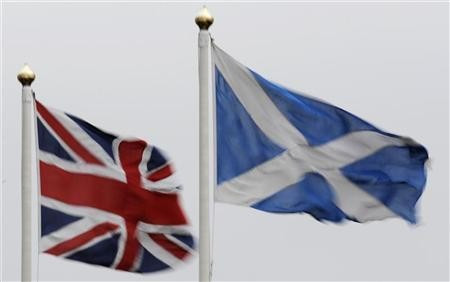Scottish Independence Threatens UK Jobs and Growth
Jobs and economic growth will be at risk if Scotland votes for independence as the split will entail extra regulatory and administrative costs as well as reduced access to the British market.

Britain's business secretary Vince Cable warned the markets that Scotland's independence create a fragile jobs market and and threaten economic growth, if the 5 million population votes for a split in Autumn 2014.
"The union works for businesses on both sides of the border," said Cable.
"Breaking up Scotland's most lucrative market would destabilise enterprise and potentially put growth and jobs at risk."
Scotland many depends on Britain for its export revenue.
In 2011, Scottish exports to the rest of Britain were worth €45.5bn (£,$), excluding oil and gas, which is double the value of exports to the rest of the worl and four times more than its European Union exports.
However, the Scottish government hit back and said independence would end decades of economic mismanagement and that Scotland would still be aiming to keep a single market for goods and services, as well as a currency union with the rest of Britain.
A Scottish government said "independence would allow future Scottish Governments to require proper connectivity for rural areas, boost business growth and ensure a combined economic regulator that is both cheaper and more efficient than Westminster's bureaucracy."
Whitehall has voiced concerns for Scottish independence for the last two years although recent polls show 60% of people will vote against a split.
In February this year, the UK government reinforced its warning that Scotland would have to reapply for its European Union membership if it becomes independent and therefore a currency union under independence would not work.
The Confederation of British Industry (CBI) also warned of the severe impact independence will have on enterprise.
"Scottish independence risks hampering this - businesses could have to deal with different regulations and currencies, for example, which would inevitably have a negative economic impact," said John Cridland, Director-General at the CBI.
European Commission President Jose Manuel Barroso cast doubts over Scotland's EU membership in December last year, after saying that EU law states that newly formed independent states would have to reapply.
"What I said, and it is our doctrine and it is clear since 2004 in legal terms, if one part of a country - I am not referring now to any specific one - wants to become an independent state, of course as an independent state it has to apply to the European membership according to the rules - that is obvious," said Barroso
© Copyright IBTimes 2025. All rights reserved.






















